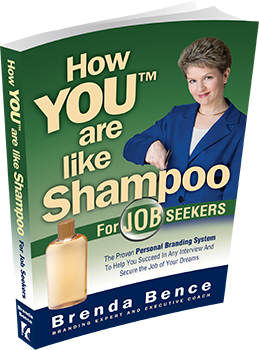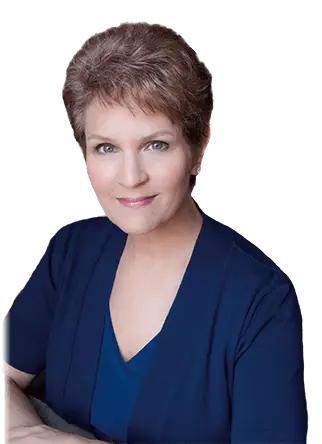One of the most common misconceptions about searching for a job is that the person with the most or best experience is the one who gets hired. Truth is: You’re more likely to be hired for a job based on your connection with the interviewer than on your qualifications. And the best way to forge an instant, powerful connection with your interviewer is to define and communicate a strong job-seeker personal brand.
Personal branding – the way you want interviewers to perceive, think, and feel about you compared to other candidates applying for the same job – can help you to build a relationship with a potential employer. And, that all-important connection begins long before you walk through the company’s doors for an initial interview. In fact, a potential employer is developing a perception of your personal brand from your very first communication – whether by phone, email, or snail mail. So, even if you’ve never thought about it, you already have a job-seeker personal brand that is making impressions on your prospective employers – just by virtue of the fact that you’re looking for a job.
The key question is whether you are communicating the personal brand you want. If not, you could leave a negative impression on a potential employer that could prevent you from even getting an interview. And, if you do get an interview, how your personal brand has been perceived through your pre-interview communications can determine whether you’re a top candidate or just a “maybe” candidate.
What can you do before an interview to build a great personal brand that will establish that all-important connection and give you the edge over other applicants? Here are a few tips for creating a memorable jobseeker personal brand before you ever set foot on a potential employer’s premises.
Everybody Counts.
From your very first phone call, a potential employer begins to develop an impression of who you are. Remember: If a receptionist or assistant says you were unpleasant or unprofessional on the phone, you will automatically be at a disadvantage. So, even if someone is rude to you, hold your tongue! On the other hand, imagine how much more an interviewer will look forward to meeting you if someone mentions that you were friendly or kind by telephone.
E-Mail Charm School.
Don’t forget your e-mail etiquette! Just as you wouldn’t start a telephone conversation without “Hello,” don’t start your e-mails without a greeting. When emailing anyone at a potential employer’s office, write just as you would a regular letter. Begin with “Dear _” and end with “Sincerely” or “Best regards.” Spellcheck and proofread your e-mails, and make sure they’re written well. Unless you’re applying for a graphic artist position, don’t use colors, pictures, backgrounds, or emoticons – keep it professional! End each e-mail with a closing that includes your full name and your telephone number. Don’t make an interviewer hunt through prior e-mails or your resume to find your contact information.
Your Written “Look.”
Your cover letter and resume say a great deal about you before your interviewer ever meets you in person. This includes not only what you say and how well you say it (your “written sound”), but also how your letter and resume “look.” Unless the job in question calls for extreme artistic ability, don’t get creative when it comes to your cover letter and resume. Don’t try to stand out by using gimmicky stationery, fonts, or colors. For most purposes, a businesslike black font on white or ivory paper fits. Here’s a trick: Print out your cover letter and resume, and snail mail them to yourself. When you receive them, look at them objectively. What is your first impression? Do they convey the job-seeker personal brand you want them to? Do they look professional and present you as an exceptionally competent person? Of course, don’t spend so much time trying to make your cover letter and resume so perfect that you never actually send them out. Your dream job will remain a dream unless you get your information out there, and into the right hands.
Big Words? Big Mistake.
Many job-seekers use big words in a cover letter or resume, trying to demonstrate their intelligence. But doing so could actually make you come across as trying too hard and can even make your communications harder to understand. So keep it simple. Make your letter and resume crystal clear and to the point. What tasks did you perform at previous jobs that will benefit your potential employer? What talents will best serve your target company’s needs? The faster a potential employer can tell from your resume that you have the right experience or training for the job, the faster you’ll get a phone call to set up an interview.
Detective Work.
Besides making a great impression by phone, e-mail, and letter, take the time to prepare well in advance for your interviews. Learn everything you can about the company from any communications, advertisements, press releases, and articles that you can find. Review the company’s website, and search the Internet for other items about the organization. Look for the company’s employees on LinkedIn.com, and research the kinds of people who work there. What does this company value, and what is its culture like? Demonstrating that you have done your research in an interview will help you cut through the clutter of other applicants and build a stronger job-seeker personal brand.
Two Interview “To Do” Lists.
Knowing more about the company helps you list the key points you want to get across in each interview about your experience and about how you are a good “fit” for that company’s culture and needs. Then, make a second list of the questions you want to ask about the position. Put these questions in order of priority because you might not be able to ask all of them during the span of one interview.
Ready for Anything.
The most important list to make prior to an interview is every question that you can think of that the interviewer might ask you. Then, practice your answers. Ask a friend to help you, and conduct mock interviews so that you can be ready for nearly every imaginable scenario. How can you stay true to, and communicate, your job-seeker personal brand in every one of your answers? Ask your friend for honest feedback, and videotape the mock interview, if possible. Watch the videotape together, and discuss where you could improve your interview performance.
Personal branding is one of the best ways to get noticed in a pool of job applicants. When you take the time to create your best possible job-seeker personal brand, you will place yourself as a candidate not just for a good job, but for that one great job you really want.

How YOU™ are like Shampoo: For Job Seekers
Follow Brenda’s step-by-step personal branding process to land the job and the career you’ve always wanted.

 Brenda Bence is sought after across six continents as a Certified Executive Leadership Coach, internationally recognized branding expert, and the author of 11 award-winning books on leadership, coaching, and branding. A Global Certified Speaking Professional, Brenda is in demand as a top-rated motivational speaker, engaging audiences around the world, both in-person and virtually.
Brenda Bence is sought after across six continents as a Certified Executive Leadership Coach, internationally recognized branding expert, and the author of 11 award-winning books on leadership, coaching, and branding. A Global Certified Speaking Professional, Brenda is in demand as a top-rated motivational speaker, engaging audiences around the world, both in-person and virtually.